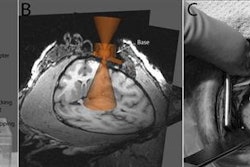Adhesive capsulitis is a condition of extreme stiffness or immobility of the shoulder, and patients are often referred for an MRI scan. In this study, researchers looked at 150 MRI shoulder reports to determine a cause, such as thickened axillary recess capsule and/or coracohumeral ligament, as well as subcoracoid fat infiltration and impression of adhesive capsulitis. Orthopedic clinical diagnosis served as the reference standard for comparison.
The researchers found a clinical diagnosis of adhesive capsulitis in 5% of the MRI cases, and 21% of MRI cases were interpreted as positive. Specificity was 80%, and negative predictive value reached 96%. Sensitivity tended to lag at 38%, while positive predictive value was a mere 9%. Accuracy came in at 77%.
In addition, infiltration of rotator interval fat, thickening of the joint capsule at the axillary recess, and thickening of the coracohumeral ligament were significant predictors (p < 0.001) of a false-positive MRI diagnosis. In those false-positive cases, 5% of orthopedic follow-up notes mentioned the imaging diagnosis, and only one patient eventually developed clinical adhesive capsulitis.
"Similar to other orthopedic clinical diagnoses, such as femoroacetabular impingement, imaging findings, although abnormal, are not necessarily indicative of adhesive capsulitis in the absence of positive clinical findings," study presenter Dr. Erin FitzGerald Alaia, an assistant professor of musculoskeletal radiology at NYU Langone Medical Center, told AuntMinnie.com. "When abnormal imaging findings are present on MRI, we recommend that radiologists either engage in a dialogue with the referring clinician or recommend clinical correlation."



















